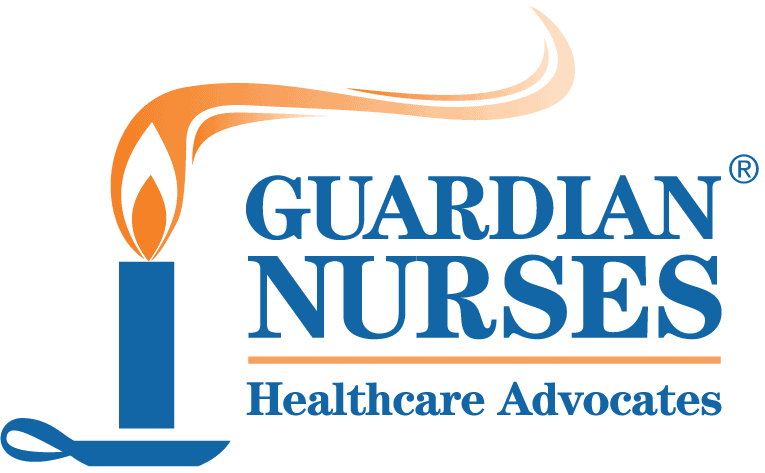November brings the holiday of Thanksgiving and with it, reminders for us all to give thanks for the blessings in our lives, however small.
Besides my friends, family, good health and chocolate chip cookies, I am most grateful for my nursing colleagues at Guardian Nurses.
Every day I get to hear, and sometimes observe, their work with our patients and clients. What is most striking to me is how much they care, how creative and resourceful they are in resolving patients’ issues, and how amazing they are at making things happen for their patients.
We recently figured out that we have more than 1,000 years of nursing experience on our team!! Think about that—a millennium of experience! And despite all those years of experience, my colleagues are still excited to start their day, still fired up to tackle the next healthcare bureaucracy challenge, and revel in their latest success!
Thanks to a recent trip to the ER with a friend, this month’s issue of The Flame is about the difference a nurse can (or cannot) make to a patient’s and family’s care and experience in the healthcare system. It stands to reason that not all nurses are alike, just as no two electricians or teachers are alike, but boy does a good nurse go a long way to improving a trip to the emergency room!
— Betty Long, RN, MHA, President/CEO, Guardian Nurses Health Advocates
What a Difference a Nurse Makes
If you’re old enough to remember the song, “What a Difference a Day Makes,” you’ll appreciate the play on words in this issue of The Flame. While in Seattle this week, a dear friend was suffering through her day with nausea, violent retching, rigors, chills, and sweats. Nothing was staying down and she, Sarah, was in obvious discomfort. By 10PM, I said to her, “We’re going to the emergency room.” We knew what she needed—fluids and antiemetic medication—and those were in the ER, not at home.
In between her episodes of vomiting, Sarah slowly got herself together. During a ‘break in the action,’ we headed to the car and made the (thankfully) five minute drive to the nearest hospital. We walked through the double doors, saw the waiting room, and thought, “Great, there’s no one waiting” but still had to wait to be called to the registration window. Behind plexiglass, the woman seemed oblivious to Sarah’s retching and moaning as she tried to answer the standard questions.
We were told to sit again as we waited for the triage nurse. Maybe 10 minutes later, Britney called us in to take the obligatory blood pressure, heart rate, temperature and pulse ox. (I seemed to be the only one concerned about her 188/110 blood pressure, by the way.) Sarah tried her best to ‘keep it together,’ but began vomiting. Britney was nonplussed as she said nothing, but took hold of Sarah’s elbow hoping to escort her out of the triage room. I spoke up and said, “She’s vomiting, can you get some tissues?” Tissue box in tow, we headed back to the waiting room.
Fortunately, maybe another 10 minutes passed before we were called back into a room and met our two nurses, one an orientee. Let’s say they were not great conversationalists, but they did start an IV, drew routine bloodwork, and thankfully, gave her Zofran which did nothing. The duo was in and out of the room, completing their tasks, documenting medication administration, and getting out of the room, it seemed, as quickly as they could. Neither asked Sarah about her past medical or surgical history. In fact, no one ever did. I had to ask them to check Sarah’s blood pressure again. It came down to 180/82. Still high, but given her clinical status, not surprising.
Their next trip in, Sarah asked, “Can I get more Zofran?” the senior nurse said, “Let’s give it 5 more minutes” which turned into 15 minutes. Writhing in pain, and still dry heaving, Sarah finally got another dose, but still no relief. When we asked for another drug, the response was “We need to ask the doctor. We’ll send her a message” to which I asked, “Isn’t she in the ER?” “Yes, but we use the messaging system.”
On their next trip in, I asked, “When do you think we’ll see the doctor?” And the senior nurse snapped, “This is an emergency room, we don’t take appointments.” Still in a great deal of discomfort, Sarah snapped back, “I’m an ER nurse, I know you don’t take appointments, but I need to see a doctor!”
Minutes later, a tall, confident physician walked into the room. Pleasant and smiling, she asked Sarah how she was doing. Mind you, neither nurse—in the 90 minutes that we were in the room–had ever bothered to ask.
I won’t ‘pile on’ with the other disappointing experiences that night, but those three nurses should have done better. The ER was not busy, their staffing ratio was 1 nurse to 4 patients, there was no reason for them to not give Sarah their full attention, offer some compassion and have a little curiosity and concern.
I am a proud nurse and always give the benefit of the doubt to a nurse, but this experience in the ER reminded me what a difference a GOOD nurse makes. And at Thanksgiving, the holiday when we count our blessings, I am very grateful for all those good nurses.

